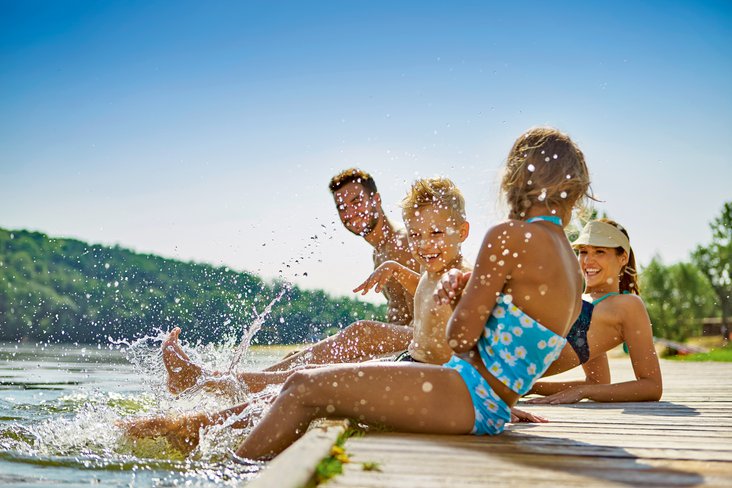On hot summer days, for many people a dip in the cool water of rivers or lakes provides welcome refreshment. But this is not without risk. According to the Swiss Council for Accident Prevention (bfu), in Switzerland around 12,000 accidents occur every year when bathing and swimming, resulting in an average of 31 fatalities. Most accidents happen in open waters such as lakes and rivers. When it comes to water sports, the greatest danger is drowning. But jumping into unknown, murky water can also lead to serious injury. Particularly with drowning accidents, every minute counts and Rega’s help is in demand: last year, the helicopter crews went into action on around 50 occasions after drowning and swimming accidents. In addition, a Rega helicopter was called out more than 30 times to search from the air for missing persons in the water.
To ensure that you can enjoy your dip or swim to the full, the Swiss life-saving society, Schweizerische Lebensrettungs-Gesellschaft (SLRG), recommends that you prepare well for the forthcoming bathing season and study the recommendations of the local water-rescue or life-saving organisations before your trip to a lake, a river, or the sea. On the next page, you can find the SLRG’s swimming rules of conduct (see box). Many people may be familiar with them, but it nevertheless does no harm to read them again before the start of the season. If you use your common sense, listen to your body and do not overestimate your abilities, nothing stands in the way of your time on, in and around the water being a safe and enjoyable experience.
Marc Audeoud, rescue specialist at the SLRG
Someone gets into trouble in a river or lake. How do I react correctly?
Raise the alarm immediately so that professional help arrives on the scene quickly. You can then try to calm the person down and give them instructions to guide them to the shore. If flotation devices such as lifebuoys, Baywatch buoys or similar are within reach, throw them to the person in difficulty. Another possibility is to hold out a branch or throw a rope for them to catch on to. In this way, you can pull the person ashore without having to get into the water. Only if these options are not possible and you feel confident should you go into the water yourself to rescue the person. For by doing so, you can put yourself in danger too.
Why is it dangerous to go into the water myself to help someone?
In a river, there are various potential hazards such as driftwood or obstacles such as bridge pillars. Drowning people also tend to flail their arms around or cling to the rescuer, which can be dangerous for both of them. As a rescuer, always take a flotation device with you that the person in distress can hold onto, and use it to pull them ashore. Situations such as these are discussed and practised in SLRG courses.
What do I have to watch out for when I go swimming in a lake or river?
First and foremost: never go into unsupervised water alone. You should also always have a safe flotation device with you, which can provide valuable assistance in an emergency or if you get tired. Familiarise yourself with the stretch of water beforehand, identify possible hazards, reconnoitre entry and exit points, and if in doubt, don’t go out.
